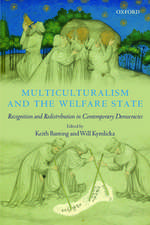Multicultural Citizenship: A Liberal Theory of Minority Rights
Autor Will Kymlickaen Limba Engleză Paperback – 19 sep 1996
Preț: 278.85 lei
Preț vechi: 308.10 lei
-9% Nou
Puncte Express: 418
Preț estimativ în valută:
53.36€ • 55.71$ • 44.16£
53.36€ • 55.71$ • 44.16£
Carte disponibilă
Livrare economică 03-10 martie
Preluare comenzi: 021 569.72.76
Specificații
ISBN-13: 9780198290919
ISBN-10: 0198290918
Pagini: 296
Dimensiuni: 155 x 235 x 19 mm
Greutate: 0.5 kg
Editura: OUP OXFORD
Colecția OUP Oxford
Locul publicării:Oxford, United Kingdom
ISBN-10: 0198290918
Pagini: 296
Dimensiuni: 155 x 235 x 19 mm
Greutate: 0.5 kg
Editura: OUP OXFORD
Colecția OUP Oxford
Locul publicării:Oxford, United Kingdom
Recenzii
L'autore intende... portare ordine in un dibattito largamente confuso e percorso da posizioni che spesso hanno rischiato più di mistificare che di analizzare i termini reali dei problemi.
This is a very important book, one that is indispensable for the present discussion of multiculturalism ... this is an immensely rich, informative, and above all clarifying work, written by a first-class philosophical mind, animated by a humane outlook. It ought to be compulsory reading for all those who want to carry on the debate in this area.
Will Kymlicka is among the most important and interesting liberal political theorists writing today ... [he] produces an elegant and extremely interesting liberal account of the character, applicability and conditions suitable for the deployment of the notion of the rights of minority cultures considered as group rights. The book is subtitled a liberal theory of minority rights and it is not too exaggerated to say that Kymlicka provides not only the first fully worked out theory of liberal minority rights but one of the most successful and satisfying accounts of liberal political theory in recent years.
The overall argument of his book, and its attentive consideration of almost every issue vital to a complex notion of multiculturalism make invaluable reading for anyone weary of simplistic declamations.
This timely and well-argued book offers a liberal defense, based on individual autonomy and social equality, of certain group-specific rights to self-government, to support for cultural differences, and to political representation. Clear, unpolemical, and open-minded, it nicely marries normative political theory and institutional analysis ... In all, this is a fine book, and the one to which students of multiculturalism must first be sent.
An important addition to liberal theory and necessary for students and scholars at all levels.
This excellent book sketches a theory of minority rights and argues that such rights can find a comfortable home within liberal political philosophy.
It is full of many stimulating insights, throws valuable light on many complex issues, and grapples with agonizing dilemmas. Above all, it appreciates the cultural embeddedness of the individual and creates theoretical space for cultural rights, thereby making liberalism hospitable to the moral imperatives of cultural pluralism.
Kymlicka's achievement is in putting culture, nationality and minorities at the centre of liberal theory. He is a philosopher who always has one eye on policy, and his book can be recommended as an exemplar in "philosophy and public affairs".
A powerful intervention in that argument [about culture, identity and collective rights].
This is an important book which clarifies the issues at stake in the current debate between individual and collective rights.
Kymlicka's book is undeniably a valuable contribution to the ongoing, liberal-communitarian debate. Those wishing to survey this terrain will find his book an excellent starting point.
This is a very important book, one that is indispensable for the present discussion of multiculturalism ... this is an immensely rich, informative, and above all clarifying work, written by a first-class philosophical mind, animated by a humane outlook. It ought to be compulsory reading for all those who want to carry on the debate in this area.
Will Kymlicka is among the most important and interesting liberal political theorists writing today ... [he] produces an elegant and extremely interesting liberal account of the character, applicability and conditions suitable for the deployment of the notion of the rights of minority cultures considered as group rights. The book is subtitled a liberal theory of minority rights and it is not too exaggerated to say that Kymlicka provides not only the first fully worked out theory of liberal minority rights but one of the most successful and satisfying accounts of liberal political theory in recent years.
The overall argument of his book, and its attentive consideration of almost every issue vital to a complex notion of multiculturalism make invaluable reading for anyone weary of simplistic declamations.
This timely and well-argued book offers a liberal defense, based on individual autonomy and social equality, of certain group-specific rights to self-government, to support for cultural differences, and to political representation. Clear, unpolemical, and open-minded, it nicely marries normative political theory and institutional analysis ... In all, this is a fine book, and the one to which students of multiculturalism must first be sent.
An important addition to liberal theory and necessary for students and scholars at all levels.
This excellent book sketches a theory of minority rights and argues that such rights can find a comfortable home within liberal political philosophy.
It is full of many stimulating insights, throws valuable light on many complex issues, and grapples with agonizing dilemmas. Above all, it appreciates the cultural embeddedness of the individual and creates theoretical space for cultural rights, thereby making liberalism hospitable to the moral imperatives of cultural pluralism.
Kymlicka's achievement is in putting culture, nationality and minorities at the centre of liberal theory. He is a philosopher who always has one eye on policy, and his book can be recommended as an exemplar in "philosophy and public affairs".
A powerful intervention in that argument [about culture, identity and collective rights].
This is an important book which clarifies the issues at stake in the current debate between individual and collective rights.
Kymlicka's book is undeniably a valuable contribution to the ongoing, liberal-communitarian debate. Those wishing to survey this terrain will find his book an excellent starting point.
Notă biografică
Will Kymlicka is Research Director of the Canadian Centre for Philosophy and Public Policy at the University of Ottawa, and Visiting Professor, Department of Philosophy, Carleton University. His previous books include: Liberalism, Community and Culture; Contemporary Political Philosophy and Justice in Political Philosophy.













